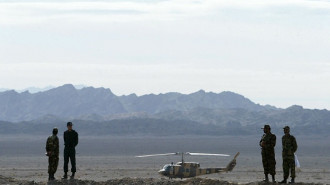News of the arrests came the morning after US lawmakers voted to end military support for a Saudi-led war in neighbouring Yemen, which has triggered what the UN describes as the world's worst humanitarian crisis.
It also marks the first major crackdown since the brutal murder of journalist Jamal Khashoggi inside the Saudi consulate in Istanbul last October, which sparked unprecedented international scrutiny of the kingdom's human rights record.
Campaigners identified the US-Saudi dual nationals as writer and doctor Bader al-Ibrahim and Salah al-Haidar, the son of Aziza al-Yousef - a high-profile activist who was temporarily released last week but remains on trial along with other women campaigners.
The latest round up started on Thursday, a day after the 11 women - some of whom accused interrogators of torture and sexual abuse in detention - returned to court to face charges that include contact with foreign media, diplomats and human rights groups.
London-based rights group ALQST identified eight arrested writers, bloggers and academics - including a pregnant woman - adding that the crackdown was linked to their support of female activists on trial.
Another public intellectual, university lecturer Anas al-Mazrou, was detained last month after he expressed solidarity with the detained women during a panel discussion at the Riyadh book fair, it added.
Prisoners of Conscience, a Saudi group that tracks political prisoners, put the number of people arrested at 10.
A State Department official confirmed that two US citizens were arrested, but refused to give more details due to "privacy considerations".
"When a US citizen is arrested abroad, the Department of State works to provide all appropriate consular assistance and seek access to the citizen without delay," the official said.
"We have already engaged the Saudi government in this regard."
Many of those arrested face travel bans, campaigners said.
"Saudi authorities seem to be hell-bent on silencing anyone who dares to speak up or even voice their opinions privately and publicly," Amnesty International's Middle East campaigns director Samah Hadid told AFP.
"This goes beyond just attacking activists and now seems to target different segments of society. This is a dangerous pattern."
|
 |
London-based rights group ALQST identified eight arrested writers, bloggers and academics - including a pregnant woman - adding that the crackdown was linked to their support of female activists on trial |
 |
|
Pressure to stay silent
"What is disturbing about new Saudi arrests is that waves of arrests keep moving from most-known to successively lesser knowns," Saudi-American activist Nora Abdulkarim said on Twitter.
"Another confusing aspect is timing, leaves one asking: 'why now?'"
Riyadh has faced pressure from major Western powers to release the women on trial, most of whom were detained last summer in a wide-ranging crackdown against activists just before the historic lifting of a decades-long ban on female motorists.
Three of them - activist Aziza al-Yousef, blogger Eman al-Nafjan and preacher Rokaya al-Mohareb - were granted temporary release last week.
Before their provisional release, the three freed women and their bail guarantors were made to sign a pledge that they will stay away from the media, according to multiple people with access to the trial.
The siblings of one of the prominent detainees, activist Loujain al-Hathloul, this week said they were being pressured by people close to the Saudi state to stay silent over her treatment in detention.
People close to the Saudi establishment have warned that public criticism by family members could prolong their detention.
"A reminder: we are not going to stay silent," Loujain's sister Alia al-Hathloul tweeted on Friday.
At an emotionally charged hearing last week, some women broke down as they accused interrogators of subjecting them to electric shocks, flogging and groping in detention, two people with access to the trial told AFP.
A Saudi prosecutor roundly rejected the accusations in the latest court hearing on Wednesday, witnesses said, reiterating the government's stance.
The next hearing in the trial, which foreign media and diplomats are barred from attending, is scheduled for April 17, activists say.
Follow us on Twitter: @The_NewArab



![Palestinians mourned the victims of an Israeli strike on Deir al-Balah [Getty]](/sites/default/files/styles/image_684x385/public/2024-11/GettyImages-2182362043.jpg?h=199d8c1f&itok=xSHZFbmc)


![The law could be enforced against teachers without prior notice [Getty]](/sites/default/files/styles/image_684x385/public/2178740715.jpeg?h=a5f2f23a&itok=hnqrCS4x)
 Follow the Middle East's top stories in English at The New Arab on Google News
Follow the Middle East's top stories in English at The New Arab on Google News
![Fakhrizadeh [AFP] Fakhrizadeh [AFP]](/sites/default/files/styles/image_330x185/public/media/images/774C39F7-8F7A-4D67-B998-27D102FCB4A7.png?h=d1cb525d&itok=j9eGvunV)

